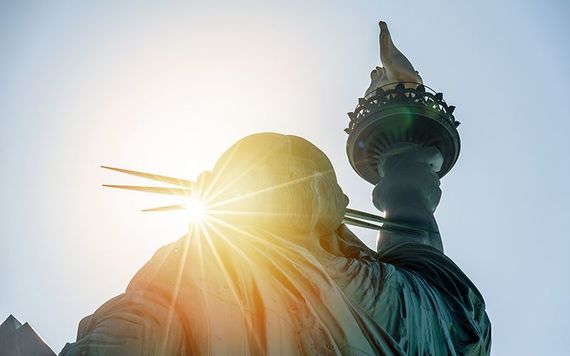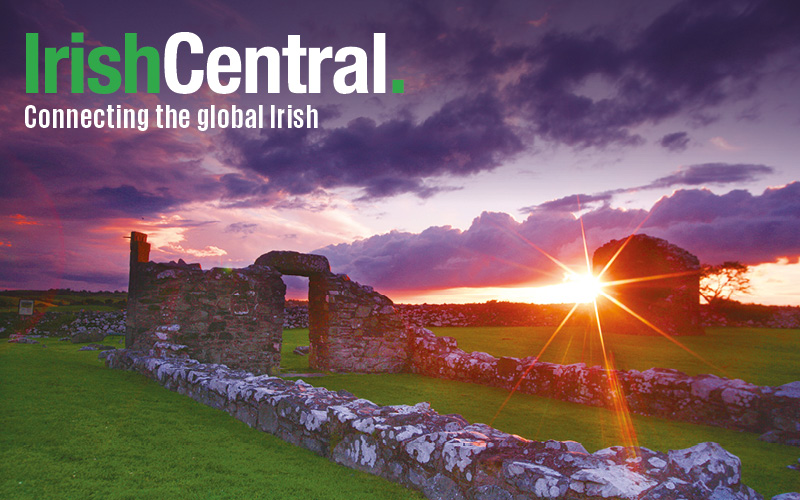Irish American Cardinal Raymond Burke could not have picked a better week to declare that resisting “large scale” Muslim immigration is not only a good thing, but it is a “patriotic” thing for Americans and Europeans to do
He said this, in Rome, the same week the Statue of Liberty Museum opened up in downtown Manhattan’s harbor.
I haven’t yet had a chance to visit the museum, but the first thing it will certainly remind you is that this stunning symbol -- forever linked to nearby Ellis Island, and all the immigrants who came through there -- was actually erected a full six years before Ellis Island opened.
Initially, the statue had just one connection to immigrants -- their labor was crucial to erecting it. But for some Americans, the statue represented a “pure” kind of native Americanism, so much so that in 1890, Judge magazine used the statue to illustrate how immigrants were, in fact, ruining America. (Sound familiar?)
Read more: Pope Francis continues to slam Trump’s cruel immigration policy
The magazine’s cover featured an angry Statue of Liberty, her robes soiled by all those Catholic and Jewish immigrants who were depicted literally as trash, hoisted by cranes and dumped in filthy heaps off of “European garbage ships.”
Got that, Cardinal Burke?
Reasonable people can debate the finer points of American immigration policy. But to pretend the “Muslim” immigrants of today presents a unique challenge to America is just plain silly.

Irish American Cardinal Raymond Burke.
So many more Catholics and Jews, many of whom were quite hostile to the American status quo, came over at the time of the Statue of Liberty’s dedication. We managed then. We will manage now.
The sheer number of jam-packed “garbage ships” passing Lady Liberty in the 1880s made it inevitable that immigrants would come to be connected to the Statue. It didn’t hurt that, in 1903, Emma Lazurus’ poem “The New Colossus,” with its references to the “tired” and “poor...huddled masses yearning to breathe free,” was added to the statue’s pedestal. In an unfortunate echo of the Judge cover, Lazurus refers to the newcomers as “wretched refuse.”
Ultimately, of course, the poem embraces immigrants, imploring them, in the voice of the statue herself, “Send these, the homeless, tempest-tost to me, I lift my lamp beside the golden door!"

The Statue of Liberty.
Having read through lots of press material on the new museum’s opening, it does not appear there are any current exhibits referring to Chauncey Depew. There should be.
When the statue opened, the guest of honor was President Grover Cleveland. But it is Depew’s speech on that rainy day that is far more interesting.
Whereas so many speakers kept things light, Depew, a prominent Republican lawyer, and future U.S. senator referred to “the problems of labor and capital, of property and poverty.”
Depew expressed widespread fears that America’s social ills might not be able to “work themselves out under the benign influence of enlightened law-making and law-abiding liberty, without the aid of...anarchists and bombs.”
Just five months earlier, in May 1887, a massive labor strike in Chicago ended in bloodshed. Following what came to be known as the Haymarket Square Riot, seven police officers and four civilians lay dead, leading to the execution of eight suspected radicals, nearly all of them immigrants.
Wait a minute! Some might say, “It is just not ‘woke’ to mention that some poor, innocent immigrants were violent and anti-American and committed political crimes. It is only a Cardinal Raymond Burke who would do such a thing.”
While others -- you know, like Cardinal Burke -- might say, “Wait a minute! I thought things were so peachy keen in the good old days. Do you mean to tell me that immigrants who were religious minorities actually were throwing bombs and anti-American political rhetoric around?”
Yes. Yes, they were.
We managed then. We’ll manage now.
Read more: Reality TV star becomes first black woman and first migrant elected to Irish county council
What do you make of Cardinal Burke's comments? Let us know in the comments section below.




Comments